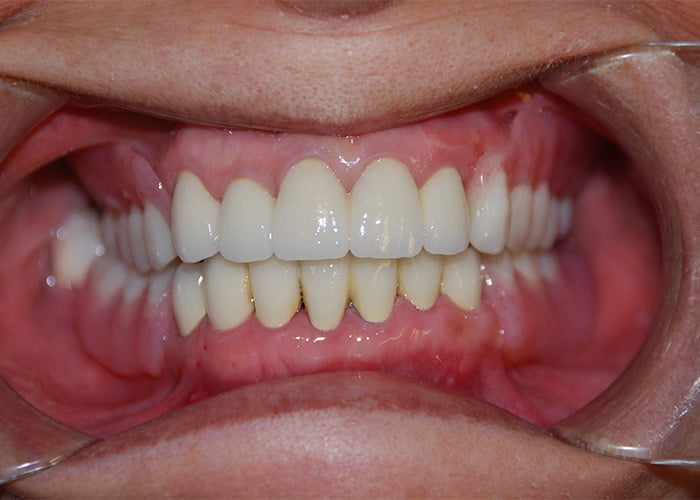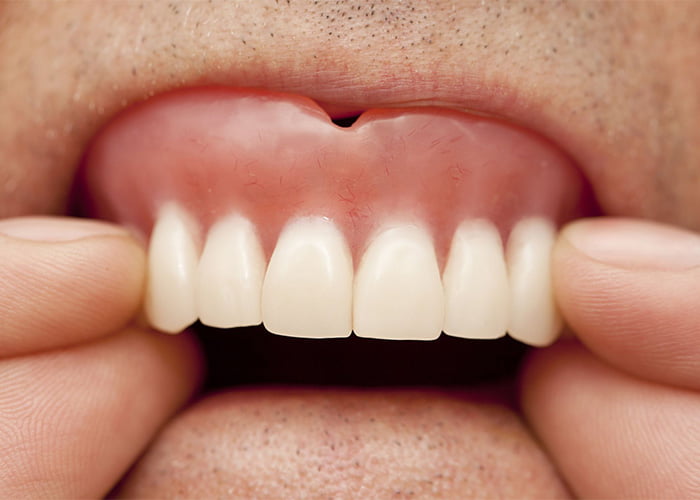Why do my dentures cutting into gums? Dentures rubbing gums can cause permanent damage to gum tissue, but there are ways to improve the situation. Temporary home remedies include warm salt water rinses, denture pads, and good oral hygiene. Permanent treatments involve having the dentures professionally adjusted or relined to relieve excess pressure and improve their fit. Dentures made from lower-quality raw materials don’t fit as well and often rub sores on gums due to distortion and shrinkage during processing.
Causes of Denture Sore Spots and Gum Pain
Denture sore spots and gum pain can be caused by several factors, including:
- Poorly fitting dentures: If your dentures are ill-fitting or don’t sit correctly on your gums, they can cause irritation and soreness.
- Gum infection or inflammation: Gum disease or infection can cause your gums to become red, swollen, and painful.
- Poor oral hygiene: If you don’t clean your dentures properly, bacteria can build up and cause irritation and infection.
- Trauma or injury: An injury to your gums or the tissue in your mouth can cause sore spots and pain.
- Allergies: The most common material used in denture fabrication is acrylic resin, but some people may develop an allergy to other materials, such as metals or plasticizers.
- Adjustments: When wearing dentures, it is normal to experience mild soreness for the first few weeks. If the soreness does not resolve within a short period, it is time to contact your dentist or dentist for an adjustment. Minor adjustments can be life-changing and change your perspective on wearing dentures.
If you experience denture sore spots or gum pain, it’s important to see your dentist to determine the cause and receive proper treatment.
Read more: What Is a Snap-on Denture?
What Are the Symptoms of Denture Sores?
Broken Teeth
Denture sores can cause stress on natural teeth that are adjacent to the dentures. Over time, this stress can cause the teeth to break or fracture. This can cause pain and discomfort and may require dental treatment to repair.
Chips or Cracks
Denture sores can cause chips or cracks in the dentures themselves. This can lead to discomfort when wearing the dentures and may require professional repair or replacement of the dentures.
Difficulty Chewing
Denture sores can make it painful or difficult to chew, particularly if the sores are located on the gums or other soft tissues in the mouth that come into contact with food.
Discomfort
Denture sores can cause significant discomfort and pain in the gums, tongue, and other soft tissues in the mouth. This discomfort can be exacerbated by wearing the dentures and can make it difficult to eat or speak comfortably.
Facial Shape Changes
Over time, denture sores can cause changes in the shape of the face, particularly if the dentures are ill-fitting or cause pressure on the underlying bone. This can lead to a sunken or shrunken appearance of the face and can affect the individual’s self-confidence.
Proper Fit
Denture sores can be a sign that the dentures are not fitting properly and need adjustment. An ill-fitting denture can cause pressure points in the mouth that can lead to sores and discomfort.
Pressure Sores
Denture sores can cause pressure sores on the gums, which can be painful and take time to heal. These sores can also make it difficult to wear the dentures comfortably.
Gum Irritation
Denture sores can cause irritation and inflammation of the gums. This can make it painful to wear the dentures and can lead to bleeding or other oral health problems.
Oral Sores
Denture sores can also cause oral sores, which can be painful and take time to heal. These sores can be located on the gums, tongue, or other soft tissues in the mouth.
Stains or Odors
Denture sores can lead to stains or odors in the dentures. This can be due to the buildup of bacteria or food particles in the sores, which can be difficult to remove without professional cleaning.

How Can I Heal Denture Sores?
At-home remedies
- Relieve the Pain: Relieving the inflammation and pain of denture sores is important, and over-the-counter pain relievers and numbing gel can help.
- Salt Water Rinse: Warm salt water rinses are recommended for mouth sores and oral health issues, and can be used up to four times a day to ease discomfort and promote healing. Simply combine 1/4 cup of warm water and 1/4 teaspoon of salt and swish in your mouth for 30 seconds.
- Giving Your Mouth a Break: Take your dentures out every night before bed to give your mouth a chance to rest and heal. Keep them in long enough to get used to them, but let your gums have a break from the pressure of supporting them.
- Good Oral Hygiene: Good oral hygiene is essential for preventing infection in dentures, such as brushing, soaking them in a denture cleaner, and cleaning gums with a wet washcloth. These steps may not prevent denture sores from forming, but they can keep them from getting worse.
Professional help
If your denture sores are severe or don’t improve with at-home remedies, it’s important to seek professional help from a dentist or denturist. They may recommend adjustments to your dentures, prescribe medication to relieve pain and inflammation or perform oral procedures to treat underlying oral health issues. Your dentist or denturist can also advise you on proper oral hygiene practices to prevent further irritation and infection.
FAQ
When is it Time for New Dentures?
Dentures are common dental prosthetics used to replace missing teeth and restore oral function. However, over time, they can wear down, become ill-fitting, and lose their effectiveness. Signs that it may be time for new dentures include changes in fit, wear and tear, discomfort or pain, changes in appearance, difficulty eating or speaking, and difficulty living. It is important to see your dentist or dentist regularly to ensure they are functioning properly and to select the best option for your oral health needs.
How Can I Prevent Sore Gums from Dentures?
Dentures can cause sore gums, but there are several ways to prevent this discomfort. Proper fit is key to preventing sore gums. Good oral hygiene is important for preventing gum irritation and inflammation. Gradual adjustment can help prevent soreness and discomfort. Avoid hard or sticky foods and avoid sticky candies and chewing gum. Proper cleaning can also help prevent gum irritation. Rinse dentures after eating and brush them thoroughly before putting them back in your mouth.
Conclusion
If you are experiencing denture sore spots or gum pain, it is essential to seek professional help from dentists in Marysville, Ohio. These issues can be caused by a variety of factors, including poorly fitting dentures, gum infection or inflammation, poor oral hygiene, trauma or injury, and allergies. By receiving proper care and regular dental check-ups, you can ensure that your dentures fit comfortably and improve your quality of life.



